#high infidelity eddies version
Text
I was wrong, Eddie doesn't need a boyfriend right now. He needs to get locked in a room with Frank for a week. Or a month.
then maybe a boyfriend
135 notes
·
View notes
Note
since there are 13 anubis residents and 13 midnights tracks…a sign a song to each kid?
this has been sitting here FOREVER i’m so sorry 💀
joy-would’ve could’ve should’ve
patricia- yoyok
nina- anti-hero
amber- bejeweled
kt- vigilante shit
mara- dear reader
willow- snow on the beach
fabian- mastermind
eddie- maroon
mick- …question?
jerome- high infidelity
alfie- sweet nothing
am i missing someone??? anyway here u go, as usual it’s all just based on Vibes and nothing else, also i used the 3am version bc lowkey idk the main album well enough lol
(bonus: all of the girls get tgw)
#mara is the entire album at some point or another and alfie is none of it so those two were just ✨ random ✨#house of anubis#also yeah it’s v sad i’m in a mood ok#asks#anon#taylor swift
19 notes
·
View notes
Note
The true crime here is how TJR uses infidelity as a plot stick to beat almost all of her main female characters with. Carrie Soto, Camilla, Daisy, Nina. I did like how in the show, Camilla said peace out until Billy went back to rehab and (crucially!) for therapy as part of his treatment. Also this will be controversial but neither the show or the book really understood the nuances of addiction, particularly substance abuse. The show just showed a bunch of Daisy being a pixie girl and hoping around, the book made it seem like Billy’s willpower keeps him sober even though the stats show that about 50% of addicts relapse within of year of sobriety (high for substance abuse), and this would’ve been doubly true in the 70’s if Billy got no additional therapy and support treatment. Also, in recovery communities, what Billy did in the book is still considered relapse, not almost relapse. I do think TJR also had a very Hollywoodesque, surface level understanding of addiction.
I would agree--and I didn't mean to imply that Billy taking a sip isn't a serious issue, sorry about that! It's just nowhere near the extent of what he did on the show, and I think that his trigger just felt much more... real, than what occurred in the show. The fact that Billy relapsing in the book was connected to Teddy's death expanded his emotional range in the way the show just wasn't interested in. Not everything was about being torn between two women and being into drugs and alcohol; a lot of it was about his issues with his own role as man and his lack of a strong male figure in his life until Teddy came along.
Personally, I know a good number of addicts, and I don't know anyone who hasn't relapsed, so it does seem unlikely to me that Billy never would again, if not, of course, technically impossible. For the sake of a book, I don't think that I needed to know every minute of Billy's life after the band broke up. Do I think the Billy of the book would have gone to therapy, ever? Nope, I sure don't. And I don't think I would've wanted him to, tbh. He still needed therapy at the time of the interview; that's part of why he was a compelling character to have interviewed. He couldn't come to terms with everything he did. He was a loving husband and father, and he was also deeply damaged and self-loathing. Both of those things can exist in one space. I mean, how many people have fathers that they'd call great fathers--who also seriously need therapy? Probably many.
I was willing to accept the book's version of Billy white knuckling it through sobriety because I think that this was something the book established really well as a hallmark of his character. It was the double-edged sword of his personality. Billy was the type of guy who thought he needed to be a Real Man for his family the way his father never was. He would sacrifice a lot to be that guy--not just the substances he found solace in, but his feelings for Daisy, his music, his art. And then any issues he had he'd take out on people like Eddie, Graham, etc. I imagine he and Camila had highs and lows after the band broke up, like many long term marriages, and those highs and lows came back to his white knuckling personality.
So yeah, I totally agree that the book wasn't realistic about it either--but I also think the book just was better product in terms of character consistency, so I was willing to believe in it. Billy's sobriety (as it was) was kind of a plot device, versus something true to life. I think the book's version of.... a lack of reality, was also more palatable to the rather goofy version on the show.
I mean, the book also really didn't get into nasty shit that comes with addiction either--like, as much as Daisy was snorting everything that moved, she probably should've had some nose bleeds at least. Shit the bed like Kendall Roy, girl! Wake up in your own vomit. Be GROSS. In the book, the fact that they're all telling the stories themselves makes it feel more like they're glossing over embarrassing shit, but the show isn't that, not really. So it was wild to me to see Daisy do her little Stevie Nix dance to express how high she was, and having a pretty aesthetic~ overdose.
Basically: both were unrealistic, for sure, but the book was a more artistically valid approach to unrealism, whereas the show was just. Lifetime drug addiction. "Augusta's Gone", but it's Daisy Jones.
I don't mind TJR's fixation on infidelity; I actually really love how the book dealt with it, because it was so gray. But I do think that none of her other works hit it as hard as this one does, and the show just. Isn't vaguely interested in nuance.
8 notes
·
View notes
Text
you're the one that i want
read it on the AO3 at https://ift.tt/2Z41b7t
by tempestbreak
"It’s just… I don’t want you to look back on this and regret it. I don’t know if I’m ever gonna see you again, and—”
“Don’t talk like that…”
“It’s true! I had the best summer of my life, and now you have to go away. It isn’t fair.”
“You really think this is the end?”
“…I’d like to think it’s just the beginning.”
--
Or: It's the summer of '58 when Richie and Eddie meet on the beach and fall in love. It's the fall of '58 when Richie and Eddie meet at Rydell High and realize how little they knew each other.
Words: 23207, Chapters: 1/1, Language: English
Fandoms: IT (Movies - Muschietti)
Rating: Explicit
Warnings: No Archive Warnings Apply
Categories: M/M
Characters: Eddie Kaspbrak, Richie Tozier, Myra Kaspbrak, Beverly Marsh, Stanley Uris, Mike Hanlon, Bill Denbrough, Ben Hanscom
Relationships: Eddie Kaspbrak/Richie Tozier
Additional Tags: Alternate Universe - Grease (1978) Fusion, Greaser Richie Tozier, Prep Eddie Kaspbrak, but they're both horny af, Minor Ben Hanscom/Beverly Marsh, Implied Sexual Content, Infidelity, First Time, Switching, Anal Sex, Anal Fingering, Blow Jobs, Rimming, Spanking, only some but it's there, Semi-Public Sex, Beach Sex, Car Sex, 69 (Sex Position), Groping, Up Shorts, they're sleazy and in love, Lovers to enemies to lovers, idealized version of the 1950s, Implied/Referenced Homophobia, No Racism, Some Period-Typical Sex Negativity, some internalized homophobia, Some angst, but otherwise this is FOR FUN ONLY
read it on the AO3 at https://ift.tt/2Z41b7t
13 notes
·
View notes
Text
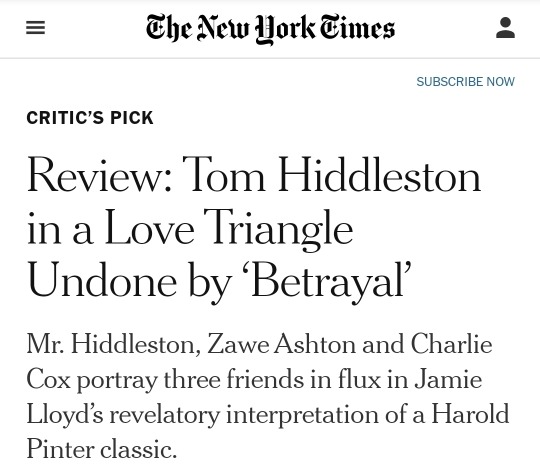
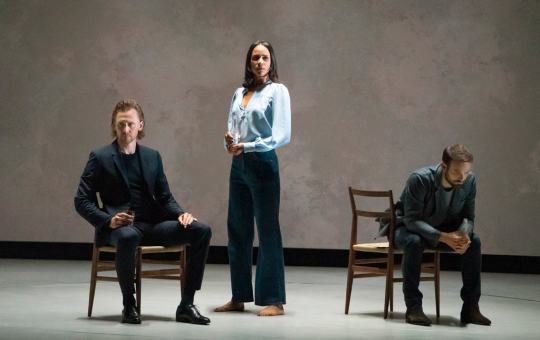
How can a naked space seem so full? Feelings furnish the stage in the resplendently spare new production of Harold Pinter’s “Betrayal,” which opened on Thursday night at the Bernard Jacobs Theater, and they shimmer, bend and change color like light streaming through a prism.
Directed by Jamie Lloyd — and acted with surgical precision by Tom Hiddleston, Zawe Ashton and Charlie Cox — this stripped-down revival of Pinter’s 1978 tale of a sexual triangle places its central characters under microscopic scrutiny, with no place to hide. Especially not from one another, as everybody is on everybody else’s mind, all the time. They are also all almost always fully visible to the audience.
This British version is the most merciless and empathic interpretation of this much performed work I’ve seen, and it keeps returning to my thoughts in piercing shards, like the remnants of a too-revealing dream. I had heard good things about this “Betrayal” when it debuted in London earlier this year, but I didn’t expect it to be one of those rare shows I seem destined to think about forever.
“Betrayal” was dismissed as lightweight by Pinter standards when it opened at the National Theater in London four decades ago, and hearing it described baldly, you can sort of understand why. The high concept pitch could be: “Love among the literati in London leads to disaster, when a publisher discovers his wife is having an affair with his best friend!”
True, the play had an unusual structure, with its reverse chronology. (It begins in 1977 and ends in 1968.) Early critics regarded this as an unnecessary and confusing gimmick. As for all that brittle, passion-concealing wit and straight-faced deception, wasn’t that the stuff of old-guard West End masters like Coward and Rattigan?
With subsequent productions and a first-rate film in 1983 — featuring Jeremy Irons, Ben Kingsley and Patricia Hodge — earlier naysayers began to perceive a creeping depth and delicacy in the work, which for me now ranks among Pinter’s finest. Curiously, despite three starry productions (the most recent led by Daniel Craig and Rachel Weisz), “Betrayal” has never been done full justice on Broadway.
Until now.
Mr. Lloyd’s interpretation balances surface elegance with an aching profundity, so that “Betrayal” becomes less about the anguish of love than of life itself. Specifically, I mean life as lived among people whom we can never truly know. That includes those closest to us; it also includes our own, elusive selves.
The three central characters here are Robert (Mr. Hiddleston); Emma (Ms. Ashton), his wife, a gallerist; and Jerry (Mr. Cox), a literary agent who was the best man at their wedding. Though the majority of the scenes are written for two, Mr. Lloyd keeps all his main characters onstage throughout. (He has also taken the liberty of introducing a fifth, silent character, in addition to the Italian waiter, played with gusto by Eddie Arnold, who appears in the original text.)
That means that when Jerry and Emma are in the rented, out-of-the-way flat where they meet in the afternoons, Robert is present as well — silent, unreacting and at some distance from the others, but undeniably there.
The hoary saying about three being a crowd comes to mind. But then sexual betrayal is inevitably crowded, isn’t it? The absent figure in the triangle is always there as an obstructive phantom, so that no interactions are unconditionally between two people. To borrow from Michael Frayn, whose “Passion Play” is my other favorite 20th-century drama about infidelity, adultery adulterates.
Mr. Lloyd’s “Betrayal” makes us feel this premise all the more acutely, by offering no distractions from the wounded and wounding souls at it center. As designed by the ever-ingenious Soutra Gilmour, and lighted with whispering subtlety by Jon Clark, the set remains a sort of modernist blank slate, like an abandoned contemporary showroom — or, perhaps, laboratory. Nor do the cast members ever change their clothes.
This means the focus is unflinchingly on how these friends and lovers behave, and on the distance between them (wonderfully underscored by a slyly, slowly moving stage). What they say is often as trivial as the most basic small talk. In Pinter, the greatest dramatic weight lies in what’s unspoken, in the darkness of unsorted feelings.

The three principal performers here allow us uncommon access to that darkness. They each achieve a state of heightened emotional transparency. And what we see, in their faces and bodies, and feel — in the less easily described energy that reaches across the footlights — is a harsh and beautiful muddle.
Pinter, like Chekhov, understood that reactions never come singly (though the shrilly opinionated discourse on social media today might lead you to think otherwise). The word “ambivalence” doesn’t begin to cover the thoughts in play in the first scene, when Jerry and Emma uneasily meet in a pub, two years after their affair has ended.
Emma has initiated this encounter. But as played with breathtakingly clear confusion by Ms. Ashton, she can’t explain why she did so. She’s looking for something she misplaced once, or let time carry off, but you know she can’t put her finger on what it is.
As played by the excellent Mr. Cox (best known here as television’s “Daredevil”), Jerry is less palpably unmoored; he would seem to have a thicker skin. And this shifts the center of “Betrayal” to its portrait of a marriage and its corrosive secrets.
As slender and sharp as a paring knife in his dark navy clothing, Mr. Hiddleston’s lacerating Robert seems to live in a state of existential mourning. He can be wittily combative, most memorably in a brilliantly staged restaurant scene with Jerry.
But you’re always aware of the regrets, the uneasiness, the sorrow behind the unbending facade. The scene in a Venice hotel room when he ever so gently, confronts Emma with evidence of her infidelity is almost too painful to watch. What you are witnessing is the conclusive collapse of a marriage’s fragile and necessary structure of illusions.
As a marquee name of films and tabloids, Mr. Hiddleston is the obvious draw here. But it’s the relatively little-known Ms. Ashton (who is also a playwright) who is the breakout star. And her deeply sensitive performance elicits a feminist subtext in “Betrayal.”
Power is a governing dynamic in Pinter. And I’ve seen productions in which Emma, as the only female onstage, emerges as a crushable odd-woman out in a boy’s club society. It’s telling that in this production she is the only major character who doesn’t wear a jacket or, more surprisingly, shoes.
She reads as more vulnerable because of this, but also as more humane and more open to figuring out just what has happened. Emma wants so much — professionally, romantically, domestically. And she’s harrowed by the realization that nothing she thought she had has ever been solidly hers.
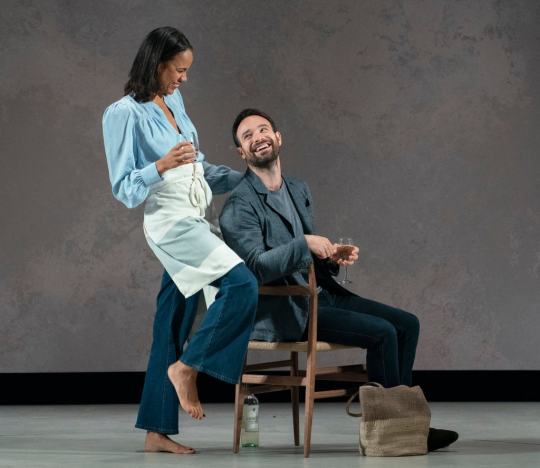
More than ever in this version, which features a melancholy soundscape by Ben and Max Ringham, “Betrayal” becomes an elegy about time and memory, in which nothing stays fixed or certain. There’s new resonance to the continuing references to a joyful moment when Jerry threw Emma and Robert’s little girl into the air at a family gathering.
It’s mentioned in the very first scene, when Emma and Jerry meet again. The problem is they can’t agree on where the event happened, in his kitchen or hers.
Ms. Ashton’s Emma tries to conceal how much this small discrepancy upsets her, but her eyes are brimming. She thought she’d always at least have this memory intact — a vision of everyone, together, happy for a moment. It turns out she was mistaken.
-
[ Link to the full article in source below. ]
#Tom Hiddleston#Zawe Ashton#Charlie Cox#Betrayal Broadway#bernard b jacobs theater#Jamie lloyd production#Harold Pinter play#Theatre tom#Tom hiddleston stage performance#Tom as robert#Zawe as emma#Charlie as jerry#Broadway debut#The New York Times review#New York City
76 notes
·
View notes
Link
How can a naked space seem so full? Feelings furnish the stage in the resplendently spare new production of Harold Pinter’s “Betrayal,” which opened on Thursday night at the Bernard Jacobs Theater, and they shimmer, bend and change color like light streaming through a prism.
Directed by Jamie Lloyd — and acted with surgical precision by Tom Hiddleston, Zawe Ashton and Charlie Cox — this stripped-down revival of Pinter’s 1978 tale of a sexual triangle places its central characters under microscopic scrutiny, with no place to hide. Especially not from one another, as everybody is on everybody else’s mind, all the time. They are also all almost always fully visible to the audience.
This British version is the most merciless and empathic interpretation of this much performed work I’ve seen, and it keeps returning to my thoughts in piercing shards, like the remnants of a too-revealing dream. I had heard good things about this “Betrayal” when it debuted in London earlier this year, but I didn’t expect it to be one of those rare shows I seem destined to think about forever.
“Betrayal” was dismissed as lightweight by Pinter standards when it opened at the National Theater in London four decades ago, and hearing it described baldly, you can sort of understand why. The high concept pitch could be: “Love among the literati in London leads to disaster, when a publisher discovers his wife is having an affair with his best friend!”
True, the play had an unusual structure, with its reverse chronology. (It begins in 1977 and ends in 1968.) Early critics regarded this as an unnecessary and confusing gimmick. As for all that brittle, passion-concealing wit and straight-faced deception, wasn’t that the stuff of old-guard West End masters like Coward and Rattigan?
With subsequent productions and a first-rate film in 1983 — featuring Jeremy Irons, Ben Kingsley and Patricia Hodge — earlier naysayers began to perceive a creeping depth and delicacy in the work, which for me now ranks among Pinter’s finest. Curiously, despite three starry productions (the most recent led by Daniel Craig and Rachel Weisz), “Betrayal” has never been done full justice on Broadway.
Until now.
Mr. Lloyd’s interpretation balances surface elegance with an aching profundity, so that “Betrayal” becomes less about the anguish of love than of life itself. Specifically, I mean life as lived among people whom we can never truly know. That includes those closest to us; it also includes our own, elusive selves.
The three central characters here are Robert (Mr. Hiddleston); Emma (Ms. Ashton), his wife, a gallerist; and Jerry (Mr. Cox), a literary agent who was the best man at their wedding. Though the majority of the scenes are written for two, Mr. Lloyd keeps all his main characters onstage throughout. (He has also taken the liberty of introducing a fifth, silent character, in addition to the Italian waiter, played with gusto by Eddie Arnold, who appears in the original text.)
That means that when Jerry and Emma are in the rented, out-of-the-way flat where they meet in the afternoons, Robert is present as well — silent, unreacting and at some distance from the others, but undeniably there.
The hoary saying about three being a crowd comes to mind. But then sexual betrayal is inevitably crowded, isn’t it? The absent figure in the triangle is always there as an obstructive phantom, so that no interactions are unconditionally between two people. To borrow from Michael Frayn, whose “Passion Play” is my other favorite 20th-century drama about infidelity, adultery adulterates.
Mr. Lloyd’s “Betrayal” makes us feel this premise all the more acutely, by offering no distractions from the wounded and wounding souls at it center. As designed by the ever-ingenious Soutra Gilmour, and lighted with whispering subtlety by Jon Clark, the set remains a sort of modernist blank slate, like an abandoned contemporary showroom — or, perhaps, laboratory. Nor do the cast members ever change their clothes.
This means the focus is unflinchingly on how these friends and lovers behave, and on the distance between them (wonderfully underscored by a slyly, slowly moving stage). What they say is often as trivial as the most basic small talk. In Pinter, the greatest dramatic weight lies in what’s unspoken, in the darkness of unsorted feelings.
The three principal performers here allow us uncommon access to that darkness. They each achieve a state of heightened emotional transparency. And what we see, in their faces and bodies, and feel — in the less easily described energy that reaches across the footlights — is a harsh and beautiful muddle.
Pinter, like Chekhov, understood that reactions never come singly (though the shrilly opinionated discourse on social media today might lead you to think otherwise). The word “ambivalence” doesn’t begin to cover the thoughts in play in the first scene, when Jerry and Emma uneasily meet in a pub, two years after their affair has ended.
Emma has initiated this encounter. But as played with breathtakingly clear confusion by Ms. Ashton, she can’t explain why she did so. She’s looking for something she misplaced once, or let time carry off, but you know she can’t put her finger on what it is.
As played by the excellent Mr. Cox (best known here as television’s “Daredevil”), Jerry is less palpably unmoored; he would seem to have a thicker skin. And this shifts the center of “Betrayal” to its portrait of a marriage and its corrosive secrets.
As slender and sharp as a paring knife in his dark navy clothing, Mr. Hiddleston’s lacerating Robert seems to live in a state of existential mourning. He can be wittily combative, most memorably in a brilliantly staged restaurant scene with Jerry.
But you’re always aware of the regrets, the uneasiness, the sorrow behind the unbending facade. The scene in a Venice hotel room when he ever so gently, confronts Emma with evidence of her infidelity is almost too painful to watch. What you are witnessing is the conclusive collapse of a marriage’s fragile and necessary structure of illusions.
As a marquee name of films and tabloids, Mr. Hiddleston is the obvious draw here. But it’s the relatively little-known Ms. Ashton (who is also a playwright) who is the breakout star. And her deeply sensitive performance elicits a feminist subtext in “Betrayal.”
Power is a governing dynamic in Pinter. And I’ve seen productions in which Emma, as the only female onstage, emerges as a crushable odd-woman out in a boy’s club society. It’s telling that in this production she is the only major character who doesn’t wear a jacket or, more surprisingly, shoes.
She reads as more vulnerable because of this, but also as more humane and more open to figuring out just what has happened. Emma wants so much — professionally, romantically, domestically. And she’s harrowed by the realization that nothing she thought she had has ever been solidly hers.
More than ever in this version, which features a melancholy soundscape by Ben and Max Ringham, “Betrayal” becomes an elegy about time and memory, in which nothing stays fixed or certain. There’s new resonance to the continuing references to a joyful moment when Jerry threw Emma and Robert’s little girl into the air at a family gathering.
It’s mentioned in the very first scene, when Emma and Jerry meet again. The problem is they can’t agree on where the event happened, in his kitchen or hers.
Ms. Ashton’s Emma tries to conceal how much this small discrepancy upsets her, but her eyes are brimming. She thought she’d always at least have this memory intact — a vision of everyone, together, happy for a moment. It turns out she was mistaken.
36 notes
·
View notes
Text
LUCY AND MISS SHELLEY WINTERS
S1;E4 ~ October 14, 1968
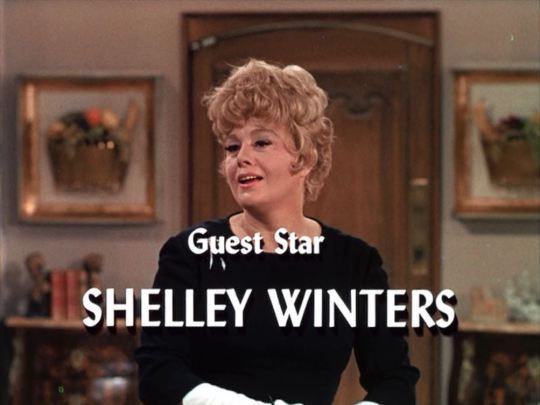

Directed by Jack Donohue ~ Written by Milt Josefsberg and Ray Singer
Synopsis
Shelley Winters needs to slim down before filming her new picture, so Lucy is employed as her private secretary and diet coach.
Regular Cast
Lucille Ball (Lucy Carter), Gale Gordon (Harrison Otis Carter)
Lucie Arnaz (Kim Carter) and Desi Arnaz Jr. (Craig Carter) do not appear in this episode.
Guest Cast
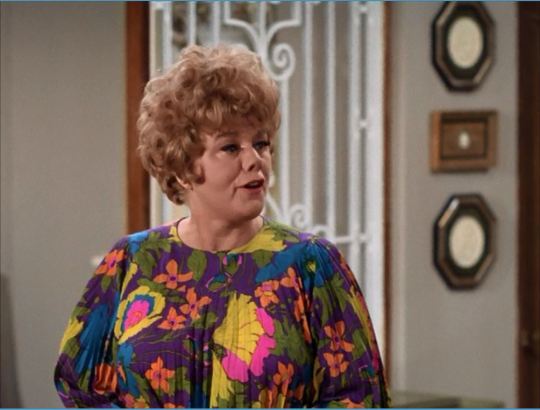
Shelley Winters (Shelley Summers) was born Shirley Schrift in 1920 (some sources list 1922) in Illinois. Her screen acting career began in 1943 under the name Shelley Winter (no ‘s’). It culminated in two Oscars for Best Supporting Actress in the films The Diary of Anne Frank in 1960 and A Patch of Blue in 1966. She also won a 1964 Emmy. One of her final roles was as Nana Mary on TV's “Roseanne.” Winters was married four times and known for her brash sexuality. She had an uncredited role in the 1946 Lucille Ball film Two Smart People. She died in 2006.
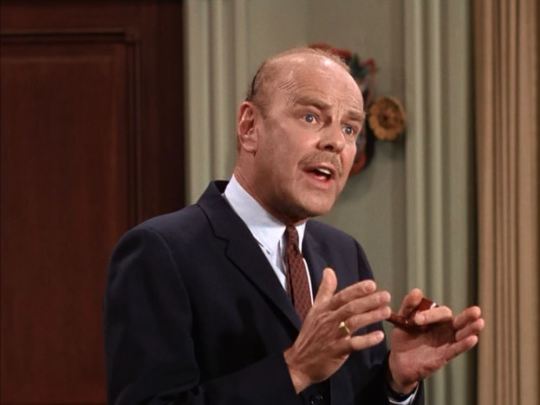
Bartlett Robinson (C.B. Wellborn) had played Mr. Wilkins in “Lucy Gets Trapped” (TLS S6;E2). This is his only appearance on “Here's Lucy.” He died in 1986.
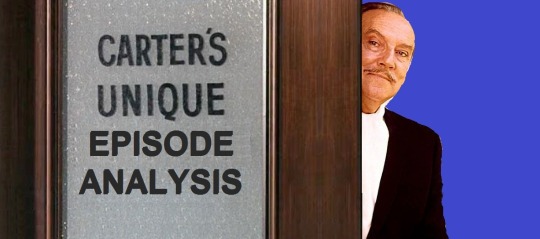
The title refers to her as “Miss Shelley Winters” just as she was billed in the 1955 film The Big Knife when she was between husbands having divorced Vittorio Gassman in 1954 and not married Anthony Franciosa until 1957. During “Here's Lucy” she was also single, having divorced Franciosa in 1960 and not remarrying until the day before her death in 2006. The original title of the episode was “Lucy and Chubby.”

This was the first time Shelley Winters guest starred on a sitcom. She is the first guest-star on “Here’s Lucy” to have won a competitive acting Oscar at the time of her appearance (The Diary of Ann Frank in 1959). She was followed by:
Elizabeth Taylor - who earned an Oscar in 1960 and appeared on the show in 1970
Ginger Rogers - who earned an Oscar in 1940 and appeared on the show in 1971
Helen Hayes - who earned Oscars in 1931 and 1970 and appeared on the show in 1972. Hayes has the distinction of being the only multiple Oscar winner on the series as well as the only actor playing a distinctly different character than herself without her name in the title. [Winters plays Shelley Summers, and essentially is different from Winters in name only!]
William Holden holds this same distinction on “I Love Lucy” and Ed Begley Sr. on “The Lucy Show.”

As the episode opens, Lucy is listening to Harry on the dicta-phone and decides to try out the newfangled recording machine for herself, first quoting a bit of Lincoln's Gettysburg Address, then singing “The Man I Love,” a torch song by George and Ira Gershwin. The song was written for, but deleted from, the 1924 Broadway musical Lady Be Good.
Overhearing Lucy sing into the dicta-phone, Harry quips “Thank you, Tiny Tim!” Tiny Tim (born Herbert Buckingham Khaury in 1932) was a singer and ukulele player known for his cover of “Tiptoe Through the Tulips.” He was a regular cast member on “Rowan and Martin's Laugh-In” which aired opposite “Here's Lucy” on NBC.
Harry reminds Lucy that “This is a business office, not Tin Pan Alley!” Tin Pan Alley is the name given an area of New York City where music publishers and songwriters who dominated the popular music of the late 19th century and early 20th century had their businesses. The origins of the name Tin Pan Alley are unclear but one account claims that it was a derogatory reference to the sound of many pianos playing (comparing them to the banging of tin pans).

Once Lucy leaves the office to get Harry's lunch, Harry also uses the dicta-phone to record himself. He sings “Shortnin' Bread” by James Whitcomb Riley in 1900. The song was famously sung by Vivian Vance as Ethel Mertz in “Ethel's Home Town” (ILL S4;E15) in 1955.
Satisfied with the sound of his voice on the playback, he remarks “Wayne Newton eat your heart out!” Wayne Newton (born 1942) is a singer and entertainer who played a version of himself on “Lucy Discovers Wayne Newton” (TLS S4;E14). He will make two appearances as himself on “Here's Lucy.”
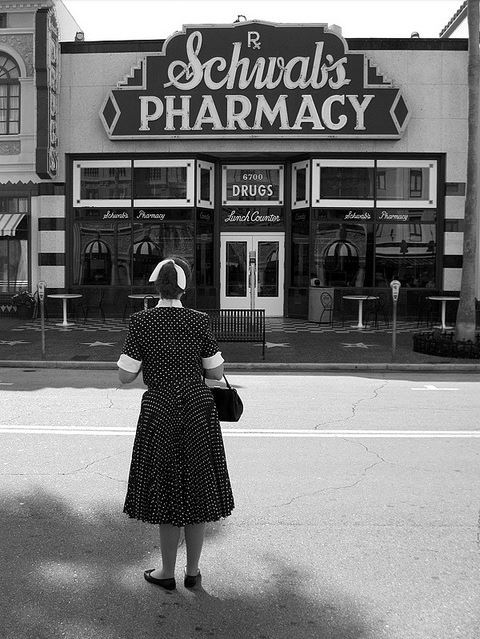
Lucy is looking forward to meeting movie producer C.B. Wellborn (no doubt named after Cecil B. DeMille), because she says hopes to break into show business, something Lucy Carter has in common with the other Lucy characters. “After all, lots of people are discovered in drug stores and elevators...” This is a reference to the legendary but apocryphal story that actress Lana Turner was discovered at Schwab's Drugstore in Hollywood. In “Lucy Gets Into Pictures” (ILL S4;E18) Lucy went down to Schwab's to be discovered but all she discovered was a stomach ache from too many ice cream sodas. Dorothy Lamour was an elevator operator in Chicago when she was discovered.
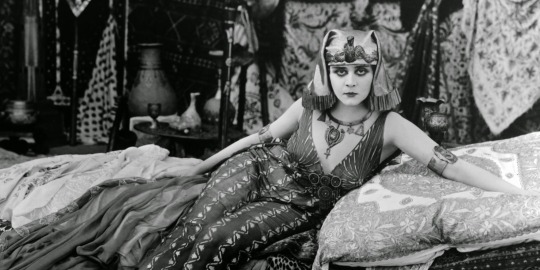
When Lucy theatrically plays up to Mr. Wellborn, Harry says to her “That will be all, Theda Bara.” Theodosia Burr Goodman (aka Theda Bara, 1885–1955) was a silent film and stage actress. She was the first to play Cleopatra on film in 1917 (now lost). Lucy played Cleopatra on the very first color filmed “The Lucy Show” in 1963, in which Lucy was also compared to Theda Bara.

On the mantle of Summers' apartment is a photo of Shelley Winters from the 1950 film Frenchie. She glances guiltily at the photo when she is about to overeat.
Summers brags about having two Oscars, just like Shelley Winters. Wild in the Street starring Shelley Winters had opened in late May 1968. In December 1968 Winters opened in the film Buona Sera, Mrs. Campbell starring Gina Lollobrigida.

Shelly Winters' dresses were padded to make her appear bigger then she really was. This is done so that in the final scene she appears thinner in her new black dress.
Shelley hides food all over her apartment:
A box of candy in the chandelier
A banana in a framed fruit basket
A bowl of spaghetti from the TV (which is actually a mini-fridge)
A whole pizza pie on the turntable of the stereo
The scene is underscored with Theremin music, which is an electronic instrument mainly used during dream sequences and in sci-fi and horror movies. It was first used to underscore Lucy Ricardo's dream of Ricky's infidelity in “Lucy and the Dummy” (ILL S5;E3). It was also used in “Lucy Gets Mooney Fired” (TLS S6;E9) when Lucy Carmichael and Mr. Mooney are 'gaslighting' Mr. Cheever into rehiring him!
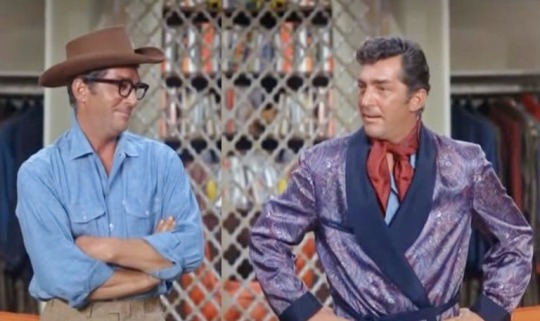
When Lucy catches her with the pizza, she claims it is a Dean Martin record and sings “When the moon hits your eye like a big pizza pie, that's amore!” “That's Amore” was written by Harry Martin and Jack Brooks and recorded by Dean Martin in 1953. “Amore” means “love” in Italian. Dean Martin guest starred on “The Lucy Show” in 1966 playing himself and his stunt double, Eddie Feldman.

Lucy discovers a rope of sausages hidden in the sofa cushion that Shelley claims are her love beads! Love beads were a necklaces worn by hippies in the 1960s as a symbol of peace and goodwill.

Shelley humorously remarks “Honey, they invented CinemaScope to get my hips in the screen!“ CinemaScope is an anamorphic lens used from 1953 to 1967 for shooting widescreen movies. Its creation in 1953 by 20th Century Fox, marked the beginning of the modern anamorphic format in both principal photography and movie projection. The anamorphic lens allowed the process to create an image almost twice as wide as the previously common format. Winters' first CinemaScope film was I Died A Thousand Times in 1955.
When Lucy bumps into Shelley and says she didn't see her, Shelley replies “Baby, on a clear day you can see me from Catalina!” The Island of Catalina off the California coast has been used as a punchline in “Lucy and Tennessee Ernie Ford” (TLS S5;E21) when the bell captain smugly says of a swanky hotel penthouse “On a clear day you can see Catalina.” This same claim was made about the Cugamonga high rise apartment in “Lucy Helps the Countess” (TLS S4;E8). In reality, it is highly unlikely (even on a rare smog-free day) to be able to see Catalina from Los Angeles, which is nearly sixty miles away.

The episode allows Winters to stretch her comic abilities. The script assigns her all the physical comedy that would normally be done by Lucy. Like Ball, Winters is game for anything and pulls it off.
Other Hollywood stars have had their surnames slightly altered for their appearances, such as Joan Blondell (Joan Brennan) and Mel Torme (Mel Tinker).
Callbacks

Preparing to make a home cooked meal for a hot date behind roommate Viv’s back, Lucy hides food all over the house in “Lucy Builds a Rumpus Room” (TLS S1;E11) just like Lucy Ricardo did when she faked a hunger strike in “Lucy Gets a Paris Gown” (ILL S5;E20).

Lucy Carmichael dieted and exercised at a fat farm in “Lucy and the Countess Lose Weight” (TLS S3;E21) in 1965. They wear pink sweat suits just like Shelley Winters!
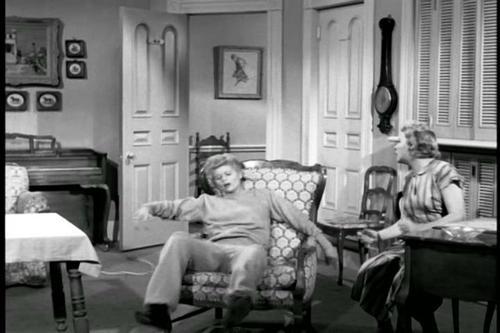
Lucy Ricardo tried to lose weight to get into Ricky's act (and a tight costume) in “The Diet” (ILL S1;E3) in 1951. I wonder if Lucy Ricardo’s workout clothes are also pink?

“Lucy and Miss Shelley Winters” rates 4 Paper Hearts out of 5
Oddly, Shelley Winters is basically playing herself, so it is unclear why she had to be re-named Shelley Summers. Many “Lucy” guest stars have used their own names and played very different versions of themselves on screen (Wayne Newton and Joan Crawford, for example). This episode may be considered politically incorrect in today’s society, which seeks to celebrate the fuller figured woman and not measure acceptance by body size.
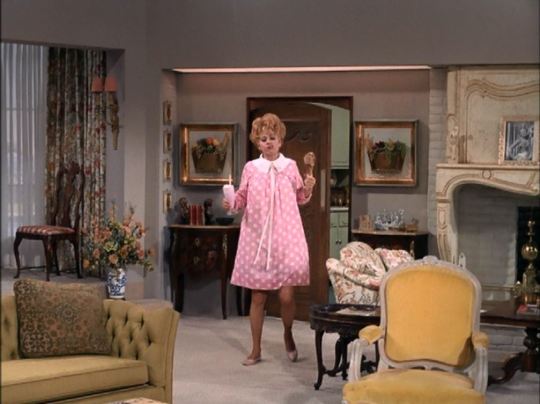
#Here's Lucy#Lucille Ball#Lucy and Miss Shelley Winters#Shelley Winters#Gale Gordon#Bartlett Robinson#Dieting#Fat#Theda Bara#Tiny Tim#CinemaScope#TV#CBS#1968#The Man I Love#Gettysburg Address#Shortnin Bread#dictaphone#Catalina#Frenchie#Love Beads#That's Amore#Dean Martin#Wayne Newton#Tin Pan Alley
9 notes
·
View notes
Link
by tempestbreak
"It’s just… I don’t want you to look back on this and regret it. I don’t know if I’m ever gonna see you again, and—”
“Don’t talk like that…”
“It’s true! I had the best summer of my life, and now you have to go away. It isn’t fair.”
“You really think this is the end?”
“…I’d like to think it’s just the beginning.”
--
Or: It's the summer of '58 when Richie and Eddie meet on the beach and fall in love. It's the fall of '58 when Richie and Eddie meet at Rydell High and realize how little they knew each other.
Words: 23207, Chapters: 1/1, Language: English
Fandoms: IT (Movies - Muschietti)
Rating: Explicit
Warnings: No Archive Warnings Apply
Categories: M/M
Characters: Eddie Kaspbrak, Richie Tozier, Myra Kaspbrak, Beverly Marsh, Stanley Uris, Mike Hanlon, Bill Denbrough, Ben Hanscom
Relationships: Eddie Kaspbrak/Richie Tozier
Additional Tags: Alternate Universe - Grease (1978) Fusion, Greaser Richie Tozier, Prep Eddie Kaspbrak, but they're both horny af, Minor Ben Hanscom/Beverly Marsh, Implied Sexual Content, Infidelity, First Time, Switching, Anal Sex, Anal Fingering, Blow Jobs, Rimming, Spanking, only some but it's there, Semi-Public Sex, Beach Sex, Car Sex, 69 (Sex Position), Groping, Up Shorts, they're sleazy and in love, Lovers to enemies to lovers, idealized version of the 1950s, Implied/Referenced Homophobia, No Racism, Some Period-Typical Sex Negativity, some internalized homophobia, Some angst, but otherwise this is FOR FUN ONLY
0 notes